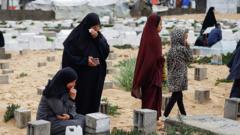“We are not fine” has now become the official Eid al-Fitr greeting among Gaza residents and on social media platforms.
In previous years, the markets were bustling with shoppers on the eve of the most significant occasion for Muslims, which marks the end of Ramadan.
During this time last year, the streets echoed with the sounds of Eid takbirs, and vendors showcased creative displays of Eid products, such as sweets filled with dates and various types of chocolates. However, this year, there is no sweets nor joy, only pain, sadness, oppression, and mourning, as expressed by many people.
Forty-seven-year-old taxi driver Muhammad al-Barbari, who is a father of six from Gaza City, was displaced with his family to Rafah six months ago. He told me: “We used to stay up all night, purchase sweets and new clothes for the children, and pray Eid in the Grand Mosque.
“Unfortunately this year, we live in a tent without the basic necessities of life.”
While conditions in Gaza were already hard and challenging before 7 October, Eid has traditionally been a respite from the hardships of life, a time of joy and happiness. Not anymore.
